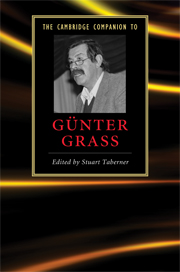Book contents
- Frontmatter
- Introduction
- 1 Biography as politics
- 2 Günter Grass’s political rhetoric
- 3 The exploratory fictions of Günter Grass
- 4 Günter Grass and magical realism
- 5 Günter Grass’s ‘Danzig Quintet’
- 6 Günter Grass and gender
- 7 Authorial construction in From the Diary of a Snail and The Meeting at Telgte
- 8 Günter Grass’s apocalyptic visions
- 9 Günter Grass and German unification
- 10 Günter Grass’s Peeling the Onion
- 11 Günter Grass as poet
- 12 Günter Grass and art
- 13 Günter Grass as dramatist
- 14 Film adaptations of Günter Grass’s prose work
- 15 Günter Grass and his contemporaries in East and West
- Guide to further reading
- Index
9 - Günter Grass and German unification
Published online by Cambridge University Press: 28 January 2010
- Frontmatter
- Introduction
- 1 Biography as politics
- 2 Günter Grass’s political rhetoric
- 3 The exploratory fictions of Günter Grass
- 4 Günter Grass and magical realism
- 5 Günter Grass’s ‘Danzig Quintet’
- 6 Günter Grass and gender
- 7 Authorial construction in From the Diary of a Snail and The Meeting at Telgte
- 8 Günter Grass’s apocalyptic visions
- 9 Günter Grass and German unification
- 10 Günter Grass’s Peeling the Onion
- 11 Günter Grass as poet
- 12 Günter Grass and art
- 13 Günter Grass as dramatist
- 14 Film adaptations of Günter Grass’s prose work
- 15 Günter Grass and his contemporaries in East and West
- Guide to further reading
- Index
Summary
Günter Grass was the most prominent German critic of the unification of the two German states that took place on 3 October 1990. In a series of blistering speeches and articles throughout the year, he argued that by perpetrating the crimes against humanity for which Auschwitz has become a synecdoche, Germany had forfeited any right to existence as a unified nation state. He also predicted that unification would precipitate massive unemployment and economic and social displacement in the former German Democratic Republic (GDR, or East Germany), as well as a rise in racist and xenophobic violence. Other leading intellectuals joined Grass in criticising the precise legal or economic means of achieving unification, but only Grass prominently and insistently rejected the whole project. By the first months of 1990 the energy generated among dissident East German intellectuals by dreams of transforming the economically and politically bankrupt GDR into a socialist utopia had largely dissipated, as it became increasingly clear that the very Volk (people), for whom these intellectuals had once believed themselves to be speaking, wanted not a second chance at a socialist experiment or an opportunity to return to the 'antifascist and humanistic ideals from which we proceeded long ago', as Christa Wolf's proclamation 'For Our Country' put it in December of 1989, but rather immediate and unconditional unification with the real, existing Federal Republic in a capitalist, not a socialist, economic system.
- Type
- Chapter
- Information
- The Cambridge Companion to Günter Grass , pp. 125 - 138Publisher: Cambridge University PressPrint publication year: 2009

